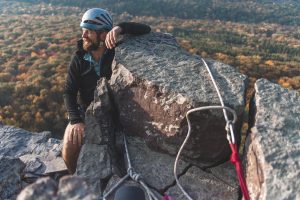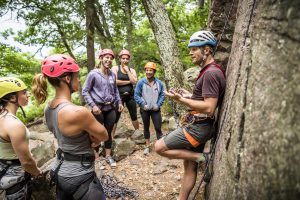
Nick Wilkes ‘00 started rock climbing with the Wisconsin Hoofers outdoor club the summer before his first year at UW–Madison. Now, Wilkes guides climbing trips with Devils Lake Climbing Guides, a rock-climbing guide service he founded in 2012.
Devils Lake Climbing Guides leads recreational climbing trips and also instructs clients hoping to learn to climb and manage risk on their own. Wilkes manages the behind-the-scenes operations of the business, which employs approximately 30 guides and instructors. Outside of the climbing season, Wilkes works as a photographer and designs websites through the other businesses he started based out of his Madison home – Isthmus Design and Nick Wilkes Photography.
“Whether you’re a website client or photography client or a climbing client, I’m just holding a space where people can explore and think about who they are and how they want to be in the world,” Wilkes says.
Fascinated with human thought and behavior since his childhood, Wilkes decided to study Psychology when he came to UW–Madison for his undergraduate degree. He also graduated with certificates in Environmental Studies and Business.
Wilkes started climbing with the Wisconsin Hoofers Outing Club after a car accident during his senior year of high school hospitalized him for multiple months. The long recovery led him to find alternatives to the fast-moving team sports he had enjoyed in high school. So, he turned to the slower-paced outdoor activities he grew up enjoying, like hiking, paddling, biking, and climbing.
After his undergrad, Wilkes completed an environmental education program at the Teton Science School in Jackson Hole, Wyoming. He then attended Antioch University New England, where he completed a master’s in environmental education and obtained a teaching credential in biology.
During summers in college, Wilkes interned with the Zion Adventure Company in Zion National Park. He returned there to work on his graduate thesis, which focused on transferring engagement in the outdoor adventure classroom to the science classroom. There, Wilkes led outdoor trips and managed communications, hiring, and finances, helping the business grow from $200K to $2M annually.
“That’s where I learned the practical aspects of almost everything I do today,” Wilkes says. “I had this foundation, having studied psychology, environmental studies, and business in undergrad. Then, I continued with environmental studies and education in grad school.”

Wilkes originally hoped to join the company as a partner, but after six years he felt ready for something new. So, Wilkes and his wife decided to move to Madison with no career arrangements in place. They lived with friends and worked waiting tables while Wilkes picked up occasional freelance website and photography work. After a few years, Wilkes missed guiding, and he climbed often at Devil’s Lake, so he started a guide service leading trips there.
“I continued doing these three things I was doing in Utah, here, under my own businesses,” Wilkes says. “I thought one or two businesses might fail, and I’d continue with the remaining projects, but that hasn’t happened yet. I’ve started to think maybe it won’t happen. In each of my businesses, I create a stage for people to explore who they are, and I do a lot of education in all my jobs.”
Wilkes finds building relationships critical to his work – from getting a good photograph to guiding clients while navigating climbs.
“Studying psychology taught me some fundamental things,” Wilkes says. “People work in lots of different ways, and you have to get to know whoever you’re working with and adapt to how they see and experience the world. As a guide, that’s relevant because not everybody understands how to get from point A to point B. I might need to spend some time really helping someone to understand a fundamental concept, so they’re not going to get lost later in the curriculum.”
Wilkes remembers his professors encouraging students to find what excites them and to keep doing it. He encourages undergraduate psychology students to be open to pursuing atypical career paths to find what fulfills them.
“I’ve had a pretty atypical career path,” Wilkes says. “It’s nothing like I could have imagined when I was a kid. It’s hard to describe … because it involves different things that don’t really go together. But it’s been very fulfilling for me. I think as a general formula, if you just keep doing the things that you love doing, it works out.”
Written by Sara Stanislawski